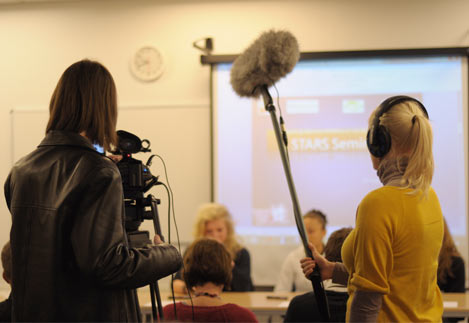PODGORICA, 22.10.2018. – Every third student of journalism doesn’t want to be a journalist. This is the result of the research made by the Trade Union of Media of Montenegro with the help of Faculty of Political Science, published in April, 2018.
The research has shown that young people enroll in journalism because they perceive that profession as socially important but, at the same time, they see it as „not profitable“. For this reason, they want to work in PR or related but better-paid professions.
Also, it has been announced that every third student in the future sees him/herself as a TV journalist, working in the entertainment program.
During one discussion at the Faculty of Political Science (Department for Media Studies) about differences between high-quality journalism and tabloid journalism, a group of students asked the following question: Why should we write well when nobody reads such articles and we don’t get paid? Looking only from the perspective of market logic students have asked rational question. However, by setting such a formulation, they’ve ignored the concepts of ethics and integrity. And, finally, they’ve (probably unknowingly) posed a big – value problem.
The world of information is huge (infinite?). Why, among all those yellow, black, incomplete, biased texts, fake news etc. quality needs to find a way – that is, in fact, the question that deserves the answer.
The fact that the quality is rare influences the motivation of future journalists. More than half of the respondents in the research consider position of journalists in Montenegro as unsatisfactory or poor. They clearly notice (especially older students) that dealing with high-quality journalism means more learning, researching and working and less earning, or – being in danger. Unfortunately, for some of them, finding a solution ends here.
Our duty is to offer students a different response to the mentioned, important problem. The situation in practice, however, is constantly deteriorating and the problem is wide, systemic.
Social status of journalists: Report Social status of journalist in Montenegro, published by Center for Democracy and Human Rights (CEDEM) in cooperation with the Organization for Security and Cooperation in Europe (OSCE) four years ago, pointed out some of the problems with which journalists face daily (they aren’t organized and united in professional structures and trade unions, a significant percentage of employees is not insured, overtime is not always paid etc.). According to the data from this survey, the average net salary of journalists in Montenegro was around 470 euros. More recent study, Indicators on the level of media freedom and journalists’ safety, published in 2016, also states that the incomes of journalists are lower than the national average.
Media freedom: According to the World Press Freedom Index (2018), published by Reporters Without Borders, Montenegro is ranked 103th out of the 180 listed countries. This report states that the authorities “have stepped up pressure on the public broadcaster RTCG; that “none of the physical attacks on journalist of previous years was punished in 2017”, that self-censorship is one of the major challenges…
Media (il)literacy: Balkan countries, according to a study by the Open Society Institute in Sofia, are not capable of resisting fake news. Montenegro is ranked 31st in the list of 35 countries. Seven regional media development organizations plan the realization of the project Media for Citizens – Citizens for Media, in the period 2018-2021. In February 2018, Agency for Electronic Media (AEM) of Montenegro and UNICEF have launched a media literacy campaign “Let’s Choose What We Watch”. The goal of the campaign is to influence the awareness of the importance of choosing media content for children. The effects of these projects have yet to be measured.
After reviewing all these data let’s return to the students. Has the Faculty of Political Science produced journalists who fail to deal with negative phenomena in society and profession or young and educated journalists are really powerless in front of the system?
Two years ago, Montenegro Media Institute has published the research on educations need of journalists and media literacy in Montenegro. Acting director of the Institute, Mr. Vladan Micunovic, said that he “can’t link the journalism studies and improvement of the quality of journalism in Montenegro”. Experts interviewed in the research have also noted that media management doesn’t invest enough in the education of its employees.
Of course, educational standards must be discussed continuously. But, we should not lose sight of the following: Education includes concepts of ethics and integrity (in Serbo-Croatian, word education – obrazovanje contains word honor, morale – obraz). In addition to practical preparation for “job market” students should prepare for ethical dilemmas in profession and outer. During various reforms over the last few years educational system, however, has chosen the path of “market logic”. In such a system, students of journalism “do not need” disciplines that build up a conscious man who thinks critically, who understands the essence of freedom.
If we don’t show to the students of journalism what the values are, and why professional and free work, even when it’s not paid enough, is better than the low-quality work, what will be the journalism of the future? And what consequences will we all endure?
Dragana Zaric, teaching assistant at the Faculty of Political Science, Podgorica
 This article has been produced as a part of the project Western Balkan’s Regional Platform for advocating media freedom and journalists’ safety with the financial assistance of the European Union. The contents of this article are the sole responsibility of the Independent Journalists’ Association of Serbia and its authors, and can in no circumstances be regarded as reflecting the position of the European Union.
This article has been produced as a part of the project Western Balkan’s Regional Platform for advocating media freedom and journalists’ safety with the financial assistance of the European Union. The contents of this article are the sole responsibility of the Independent Journalists’ Association of Serbia and its authors, and can in no circumstances be regarded as reflecting the position of the European Union.








